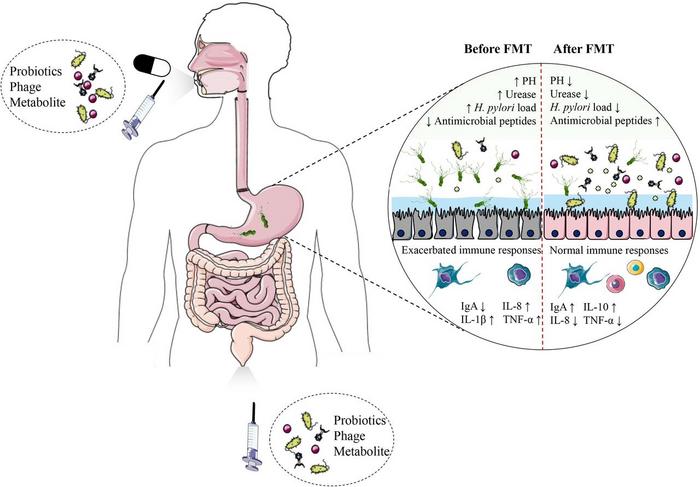Faecal microbiota transplantation (FMT) is garnering significant attention as a groundbreaking therapeutic intervention in the battle against Helicobacter pylori infection. This ubiquitous bacterium is a leading cause of gastritis, peptic ulcers, and gastric cancer, and its effective eradication has been complicated by the rise of antibiotic resistance. Traditional antibiotic treatments, previously the cornerstone of management for H. pylori, are showing diminishing efficacy, prompting researchers to explore innovative approaches to restore gastric microbiome balance and health.
FMT involves the transfer of microbiota from a healthy donor to an infected patient, aiming to restore a healthy microbial environment in the gut. This process has emerged as a promising strategy not only for recurrent Clostridioides difficile infections but also potentially for H. pylori eradication. The fundamental premise of FMT rests on the theory that an enriched and diverse microbial community can outcompete pathogenic organisms like H. pylori, disrupting their colonization and survival.
An intriguing aspect of FMT is its mechanisms of action. Researchers hypothesize that the introduction of a varied microbiota can produce competitive inhibition of H. pylori, thereby reducing its numbers and facilitating eradication. Furthermore, the beneficial microbes introduced during the gut transplantation can secrete antimicrobial peptides and various metabolites, which may create an unfavorable environment for the growth of H. pylori, aiding in improving gastrointestinal health and function.
Recent studies have illuminated some of the challenges linked to conventional treatments for H. pylori, which often involve combinations of antibiotics and proton pump inhibitors. These regimens can lead to a range of adverse effects, such as gastrointestinal discomfort and changes in taste sensation. By restoring balance to the gut microbiota, FMT may not only alleviate these side effects but also contribute to enhanced patient compliance and overall satisfaction with treatment choices.
Preliminary clinical trials investigating the efficacy of FMT for H. pylori eradication have yielded promising results. A pilot study indicated an impressive 40.6% eradication rate using FMT as a standalone intervention, suggesting that this treatment could be a viable alternative or complementary therapy alongside standard eradication methods. Additional observations show that when FMT is used to augment conventional treatment protocols, it improves patients’ gastrointestinal symptom scores and decreases the frequency of treatment-related adverse effects.
While the potential of FMT in eradicating H. pylori infection appears promising, there remain significant hurdles to overcome. One major limiting factor is the variability in donor microbiota composition, which can greatly influence the outcome of FMT. Because individual gut microbiomes differ significantly, meticulous consideration and optimization of both donor selection and the preparation of fecal suspensions is critical. High safety standards and thorough screening processes are necessary to ensure that only healthy, compatible microbiota are introduced into the recipient’s gut.
Emerging research is focusing on advanced methods, such as washed microbiota transplantation (WMT), which potentially offer enhanced safety and effectiveness profiles compared to traditional FMT approaches. Studies are also delving into the properties of the microbial constituents present in fecal samples, including bacteriophages and various microbial metabolites that might exert significant effects on H. pylori colonization and persistence.
Long-term outcomes are another area ripe for exploration, particularly in understanding which patient populations stand to benefit most from FMT. Factors such as age, underlying gut health, and individual microbiota profiles could significantly affect treatment efficacy. Additionally, the risk of H. pylori reinfection remains a pressing concern, underlining the necessity of conducting long-term follow-up studies to assess the durability of FMT effects.
Ultimately, FMT represents a transformative shift in how we approach the challenge of H. pylori eradication. As researchers accumulate more data on the complexities of gut microbiota interactions and treatment protocols, evidence will continue to strengthen the case for FMT as a potentially indispensable tool in managing this pervasive infection. If conclusively validated in larger clinical trials, FMT holds the promise not only of revolutionizing H. pylori treatment paradigms but also of paving the way for microbiota-centered therapies addressing other gastrointestinal disorders.
The study that ignited this discussion highlights the importance of a multidisciplinary approach moving forward. The combination of gastroenterology, microbiology, and clinical medicine will be crucial in refining FMT techniques and understanding the multifaceted interactions within the gut ecosystem. As clinicians and researchers alike explore the uncharted territories of FMT, the implications for patient health outcomes could be profound, pointing to a future where treatments are tailored to individual microbial landscapes rather than a one-size-fits-all methodology.
As this research landscape continues to evolve, it is imperative that healthcare providers remain informed about the advances in FMT and consider its potential integration into clinical practice for treating H. pylori. The quest for more effective, less disruptive treatments in an era of increasing antibiotic resistance underscores the urgency of these investigations, making FMT a focal point of innovative medical research in the field of gastroenterology.
By embracing these breakthroughs in our understanding of gut health, we may soon see FMT as a standard component of treatment protocols for H. pylori and beyond, marking a significant stride toward reestablishing the delicate equilibrium of the microbiome and improving the health and quality of life for countless individuals afflicted by these difficult-to-treat infections.
Subject of Research: Faecal microbiota transplantation for eradication of Helicobacter pylori infection
Article Title: Faecal microbiota transplantation for eradicating Helicobacter pylori infection: clinical practice and theoretical postulation
News Publication Date: 2024
Web References: egastroenterology.bmj.com
References: Ye Z-N, Eslick GD, Huang S-G, et al.
Image Credits: By hi-Ning Ye, Guy D Eslick, Shao-Gang Huang, Xing-Xiang He.
Keywords: Helicobacter pylori, faecal microbiota transplantation, antibiotic resistance, gut microbiota, gastrointestinal health.




